The best weighted blankets to calm anxiety and get a restful night's sleep
We tested eight of the best weighted blankets of all different weights, sizes and materials
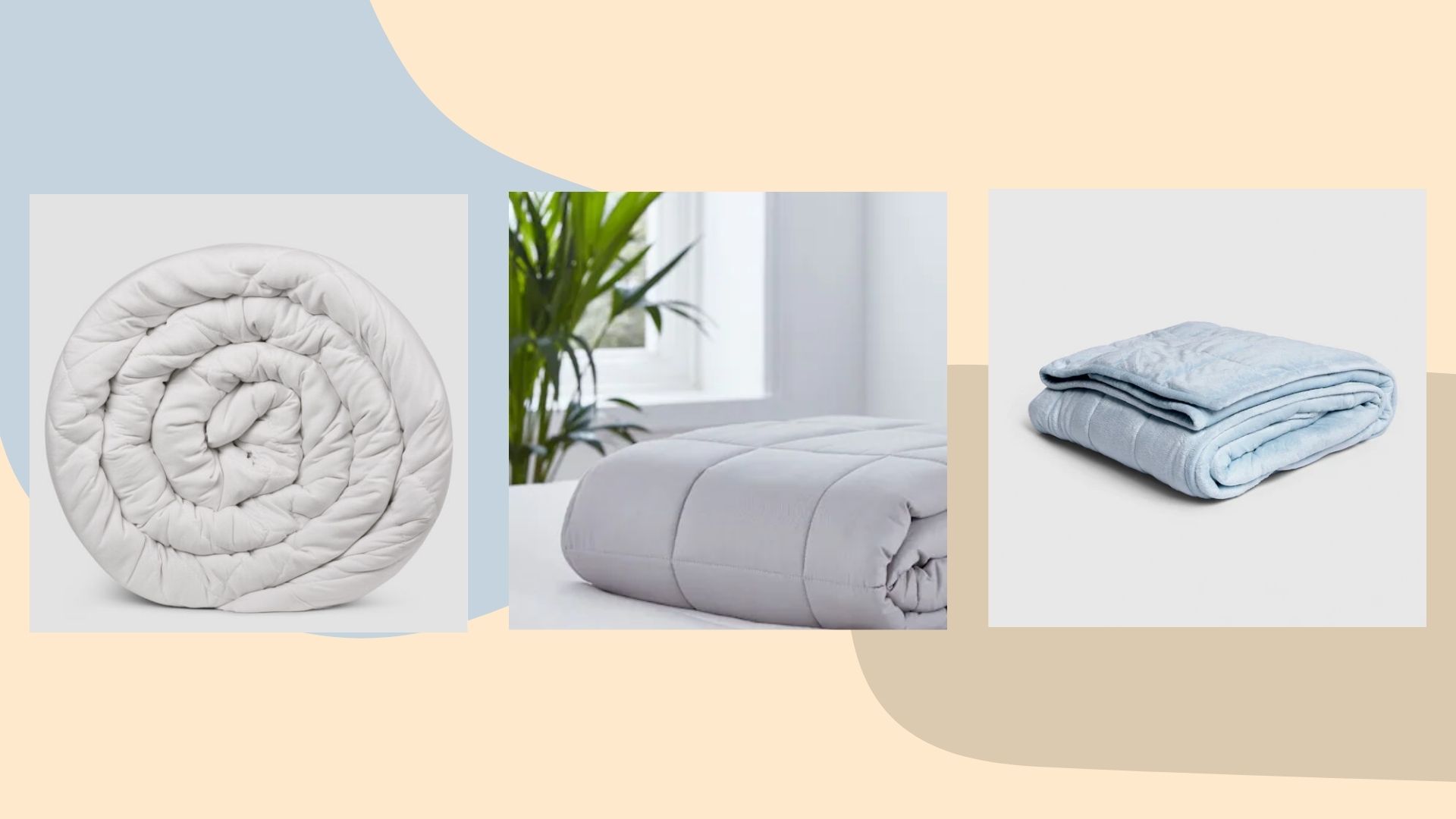

The best weighted blankets are ideal for those who suffer from anxiety or want to ensure a better night’s sleep. There are a variety of different weight options out there, and depending on your body weight and specific needs, it’s worth doing some research into what weighted blanket to get before you invest.
As one of the most-loved sleep aids and top self-care and wellness gifts all year round, weighted blankets work by recreating the feeling of a hug. They apply light pressure to the body, resulting in a feeling of calm that soothes anxiety and allows you to sleep easier.
Little beads made of usually either glass or plastic make up the filling of a weighted blanket and the fabric casing is often a brushed cotton, polyester or soft fleece material. No matter the type of blanket you buy, the total weight should be 10% of your body weight.
We tested many of the best weighted blankets for both sleeping and relaxing over several days and nights to round up a list of nine favourites. While deciding our selection of the best picks, we took weight, materials and how we felt while using them into consideration.
The best weighted blankets, as tested by us
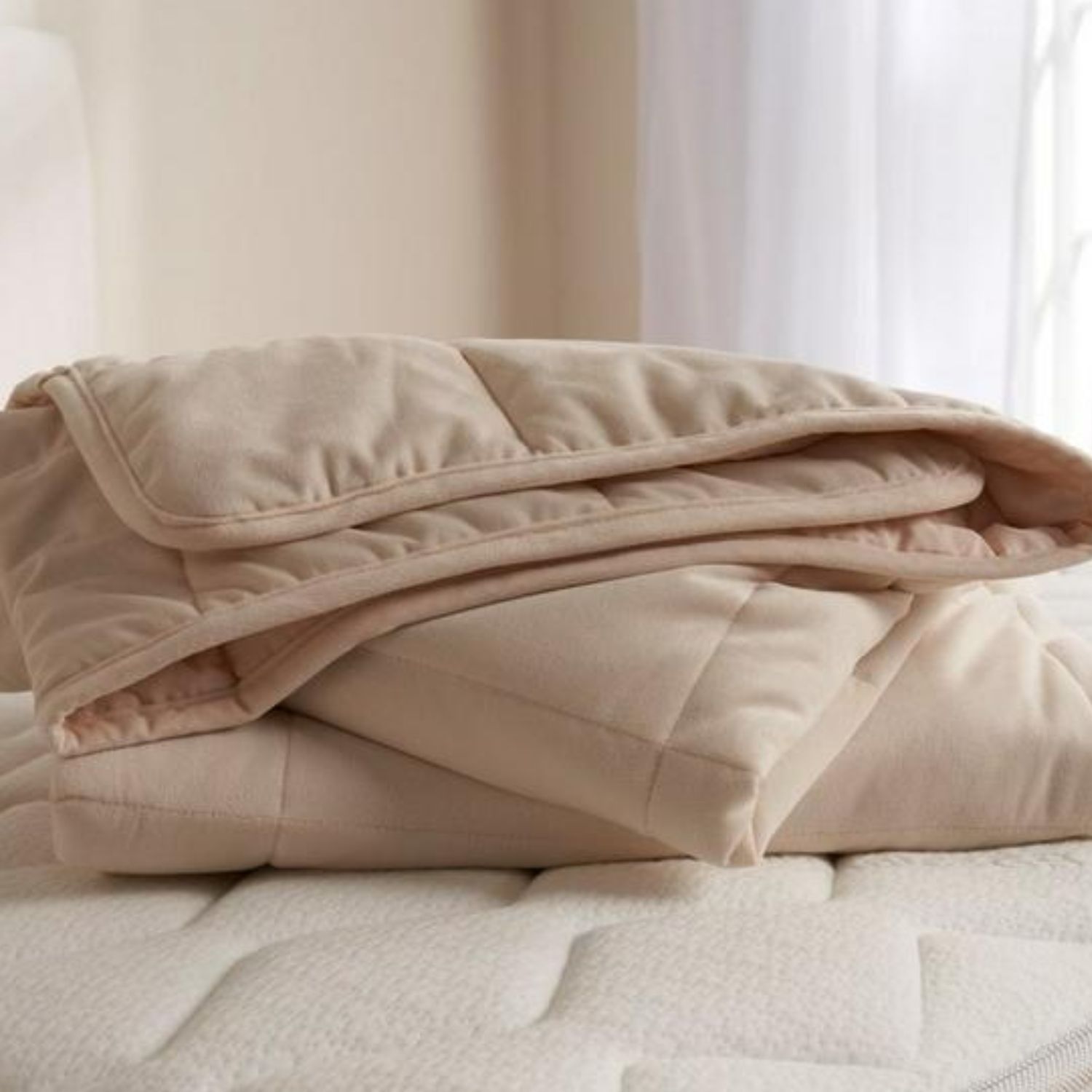
RRP: £60 | Weight: 7kg | Materials: 100% polyester velour, 100% polyester micro fabric, micro glass bean and polyester filling
This Dreams blanket is one of my favourites out of all the options I tested. Despite its 7kg weight, somehow it still feels light enough to easily transport, due to the extra fine-glass beads that make up the filling. Available in two subtle shades, the top side of the blanket is made from one of the softest materials of all the blankets I tested (a silky soft velour), while the underside has a cooling polyester finish.
Whether you want to use it on the sofa or on top of the bed sheets while you sleep, this blanket will definitely help with anxiety and in its use as a sleep aid for restless sleepers.
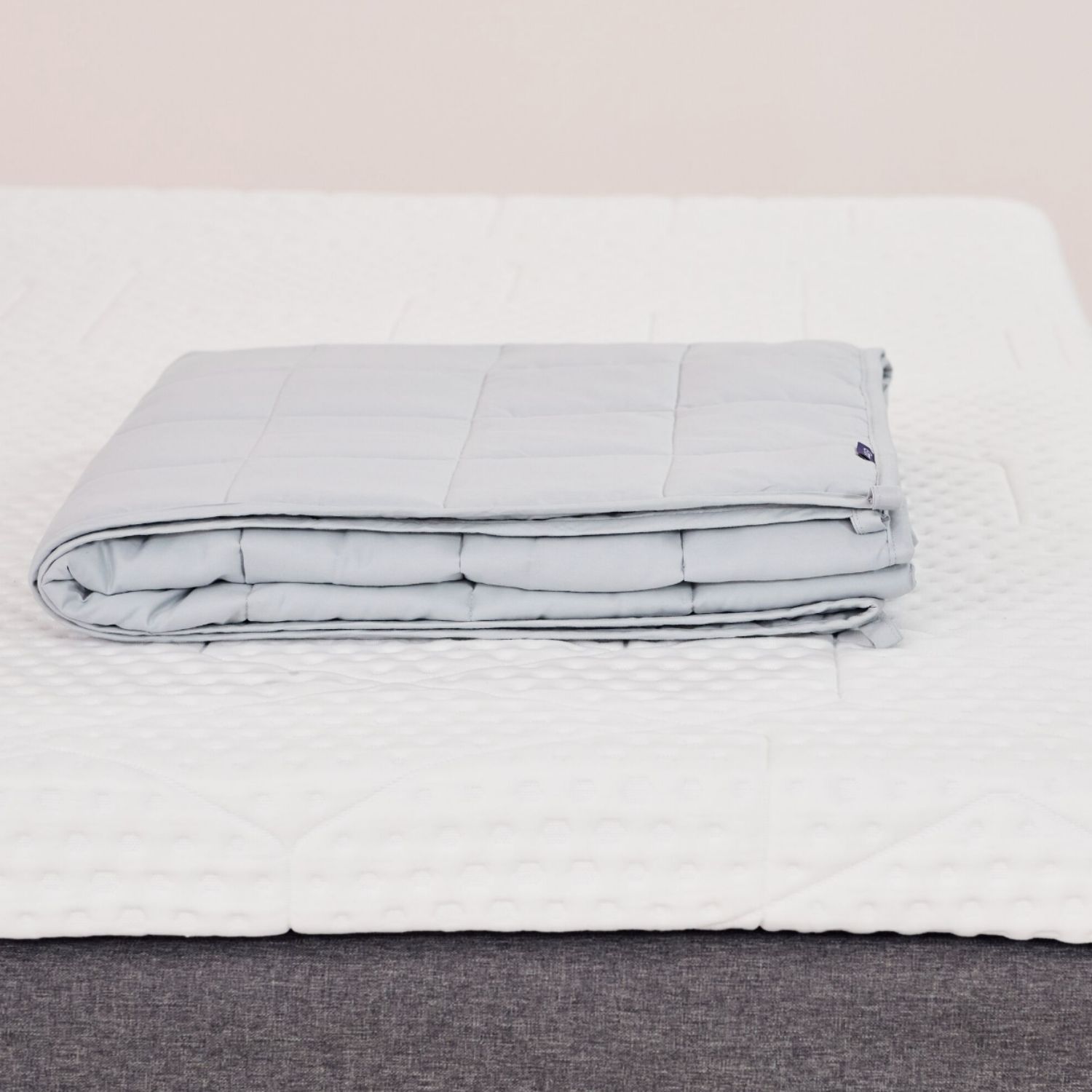
RRP: £69.30 | Weight: 7kg | Materials: cotton, microfibre, polyester, glass beads filling
Emma is behind the best pillows and mattresses, so it’s no surprise that the brand’s weighted blanket is one of our favourites, too. It’s only available in one weight, but I found the middle-ground 7kg was perfect when I tested this blanket. The cotton layer of fabric that surrounds the extra-fine glass beads is really breathable, so much so that I think you could certainly still use the blanket in hotter weather, as it’s not likely to make you overheat.
The blanket is machine washable up to 30 degrees, but if you choose to add on the Emma Bamboo Cover, this can just be washed on its own at up to 40 degrees, which may be easier. Another pro of this option is that like all of Emma’s products, it comes with a ten-year guarantee, so you can sleep soundly with that in mind.
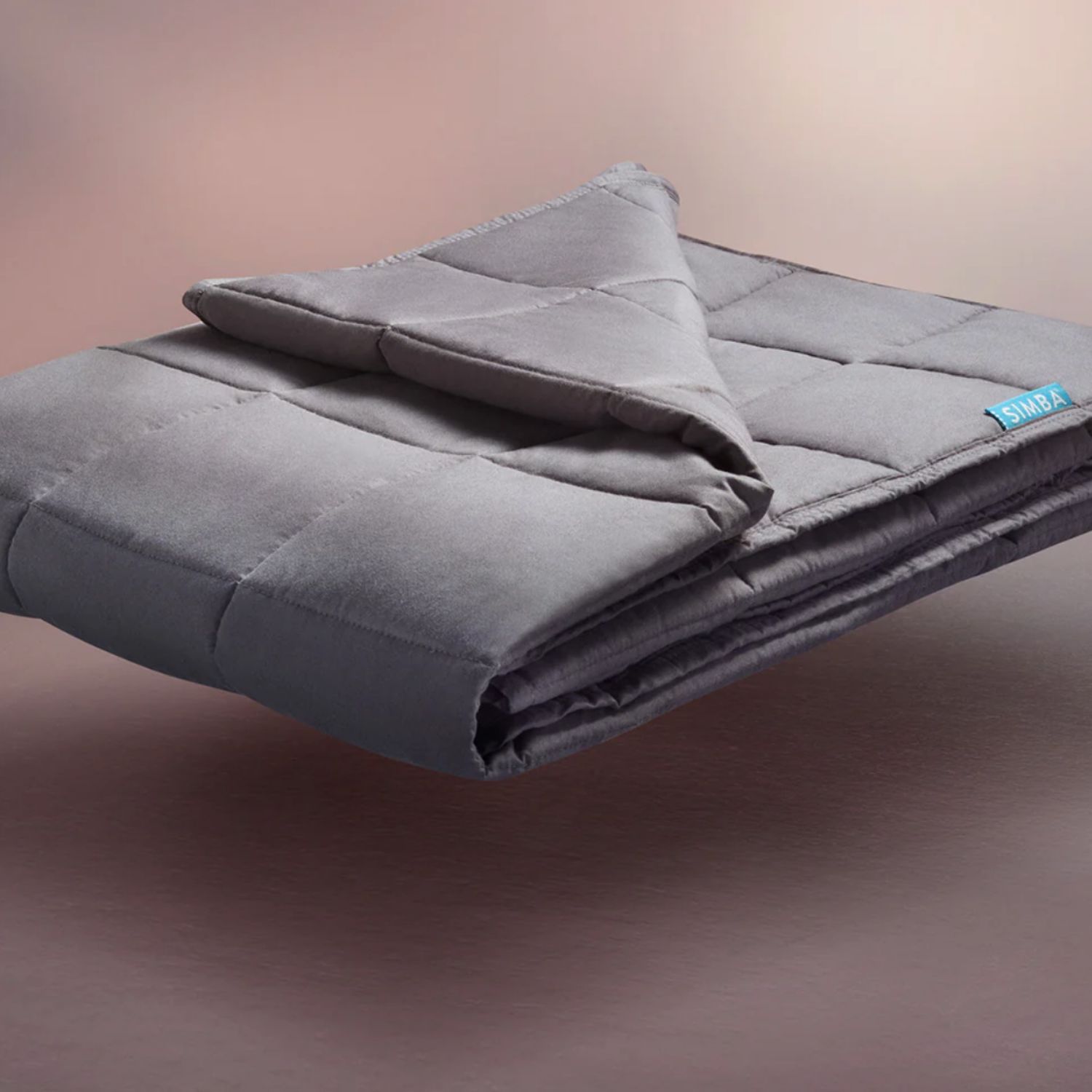
RRP: £169 | Weight: 6.8kg | Materials: 100% cotton cover, glass nano-beads filling
Another option that comes with a removable cover is the Simba Orbit blanket, but this time the cover is included in the price. The cover sheet is quite difficult to put on the blanket due to the obvious issue of its weight, but once you’ve got the hang of it, it’s a plus that the sheet can just be machine-washed whenever you need. This would be a great blanket to offer to guests if they stay over to help them sleep better in unfamiliar surroundings.
The Orbit is only available in a UK single size and only has offers a 6.8kg weight at the moment, but this is a great one to get started with if you’ve never used a weighted blanket before. Despite being a thinner blanket, there are four layers inside it, with glass nano-beads applying even, gentle pressure and a soft, cushiony layer that sits between the beads and the outside layers of the blanket, providing the ultimate comfort.
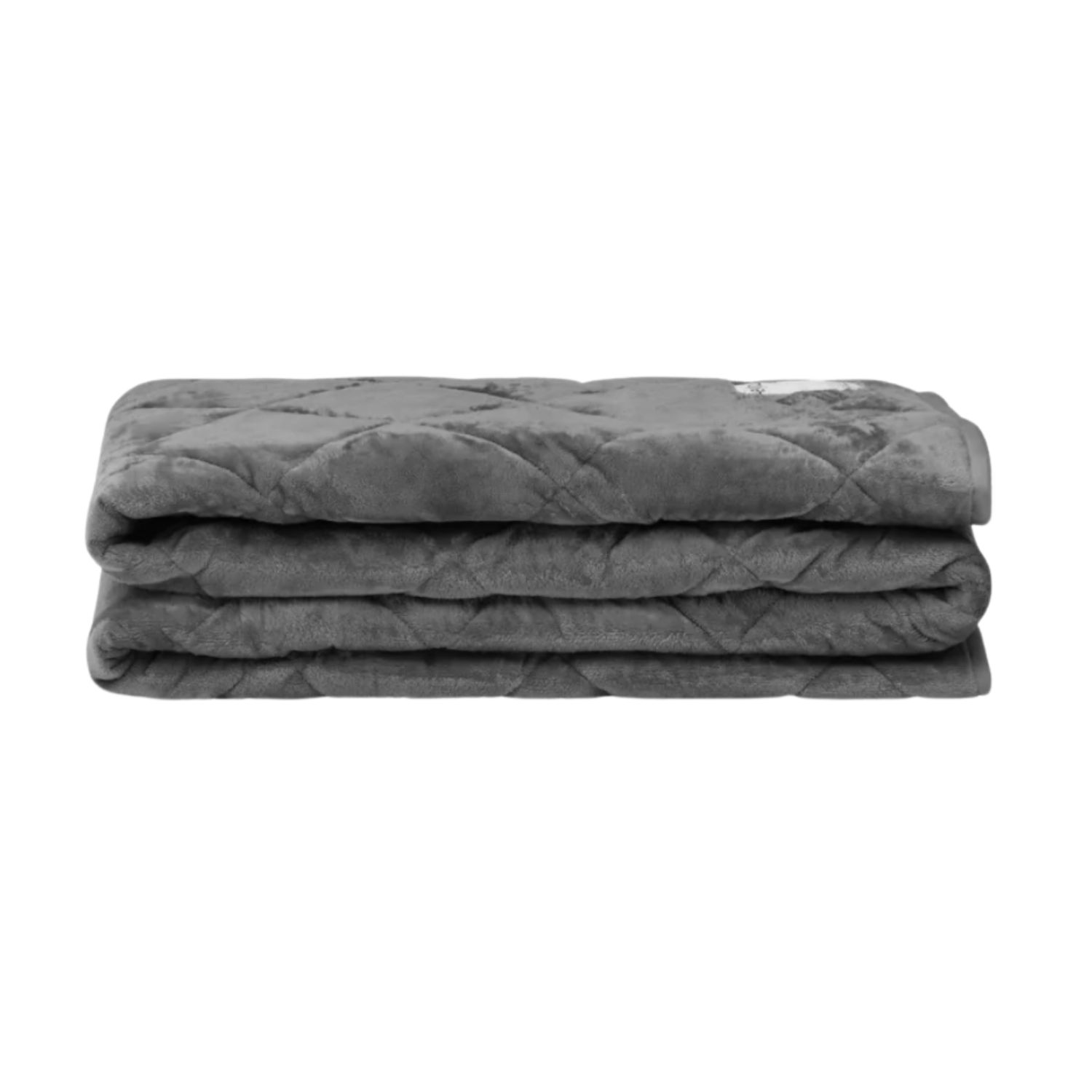
RRP: £89 | Weight: 4-9kg | Materials: 100% cotton, fleece, glass quartz pellets filling
I’ve had this blanket on my bed since it arrived, and it’s the perfect weight for a comforting and uninterrupted sleep. Both my partner and I agree that we’ve been sleeping better since having this blanket on the bed (but it’s worth noting that the Aeyla website doesn’t advise couples to share a weighted blanket, as they are only really meant to be used by one person). It’s not so thick and heavy that it will cause you to overheat (and I’m a fairly hot sleeper). This is probably because the underside of the Mela blanket is made from a breathable, cooling cotton, while the top of the blanket is a soft and cosy fleece material.
Another impressive part of the Mela blanket is the range of weights it comes in - from 4kg to 9kg, as well as being in a standard or large size. I opted for 7kg, which is very slightly ‘too heavy’ for my body weight, but I found that the extra weight was more comforting than anything and didn’t cause me to overheat or feel uncomfortable.
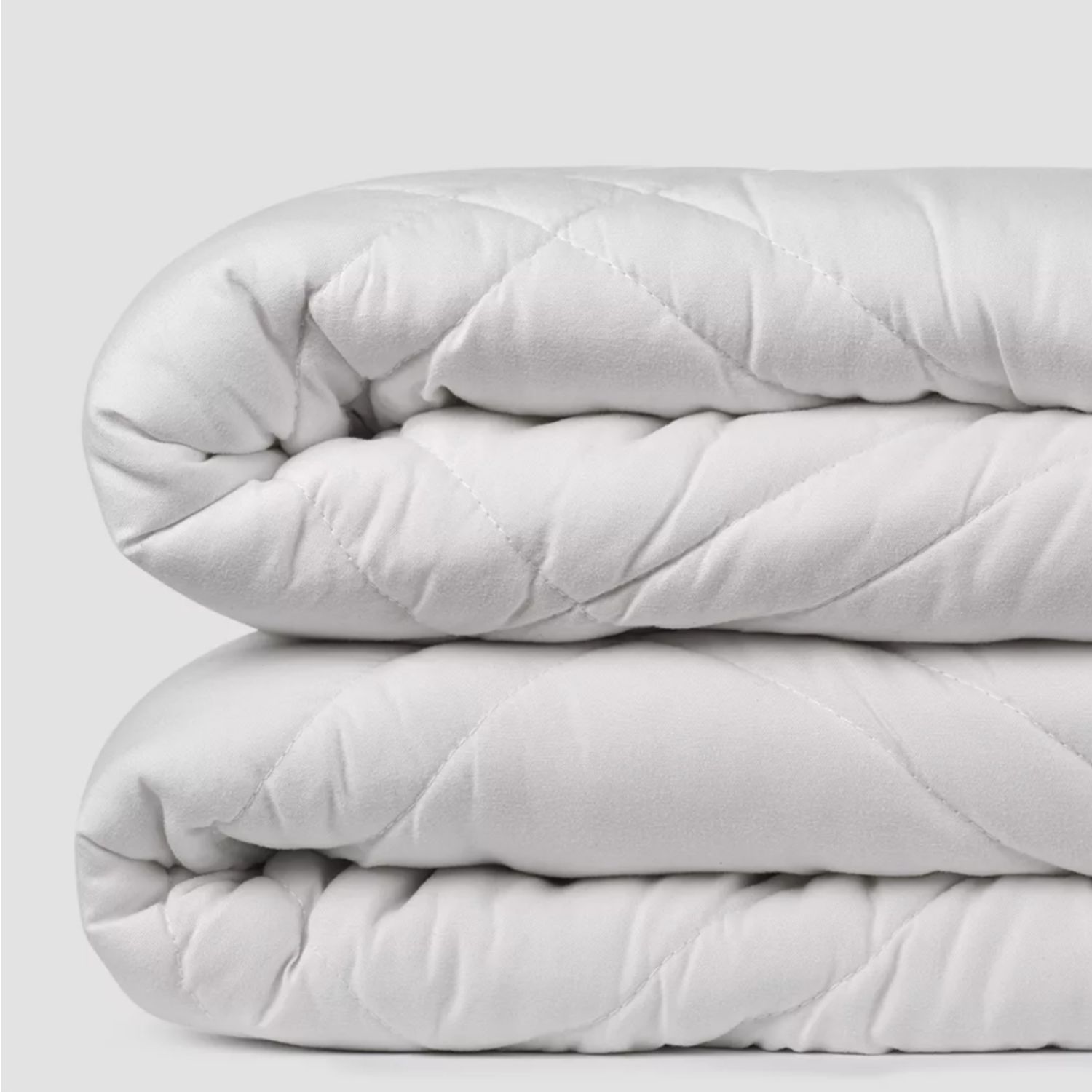
RRP: £49 | Weight: 4.7kg | Materials: Microfibre fabric and polyester, micro glass sand beads filling
If staying cool while using a weighted blanket is a big factor for you, this Kudd.ly option was created specifically for warmer weather and hot sleepers. It’s also one of the lightest options I tested, so I do feel that if you want a blanket specifically for anxiety and you’re not worried about getting too hot, you might want to opt for a slightly heavier and thicker blanket.
Due to the nature of this blanket, I did find that I felt a lot cooler while using it than I did when testing, say, the Mela option, which has a fleece layer to keep you warm. But keeping cool at night is of course another great way to drift off better, as restless sleepers who find themselves tossing and turning all night would do well to keep a cooler temperature in the bedroom. This is also a great option for those suffering from hot flushes, one of the most common menopause symptoms.
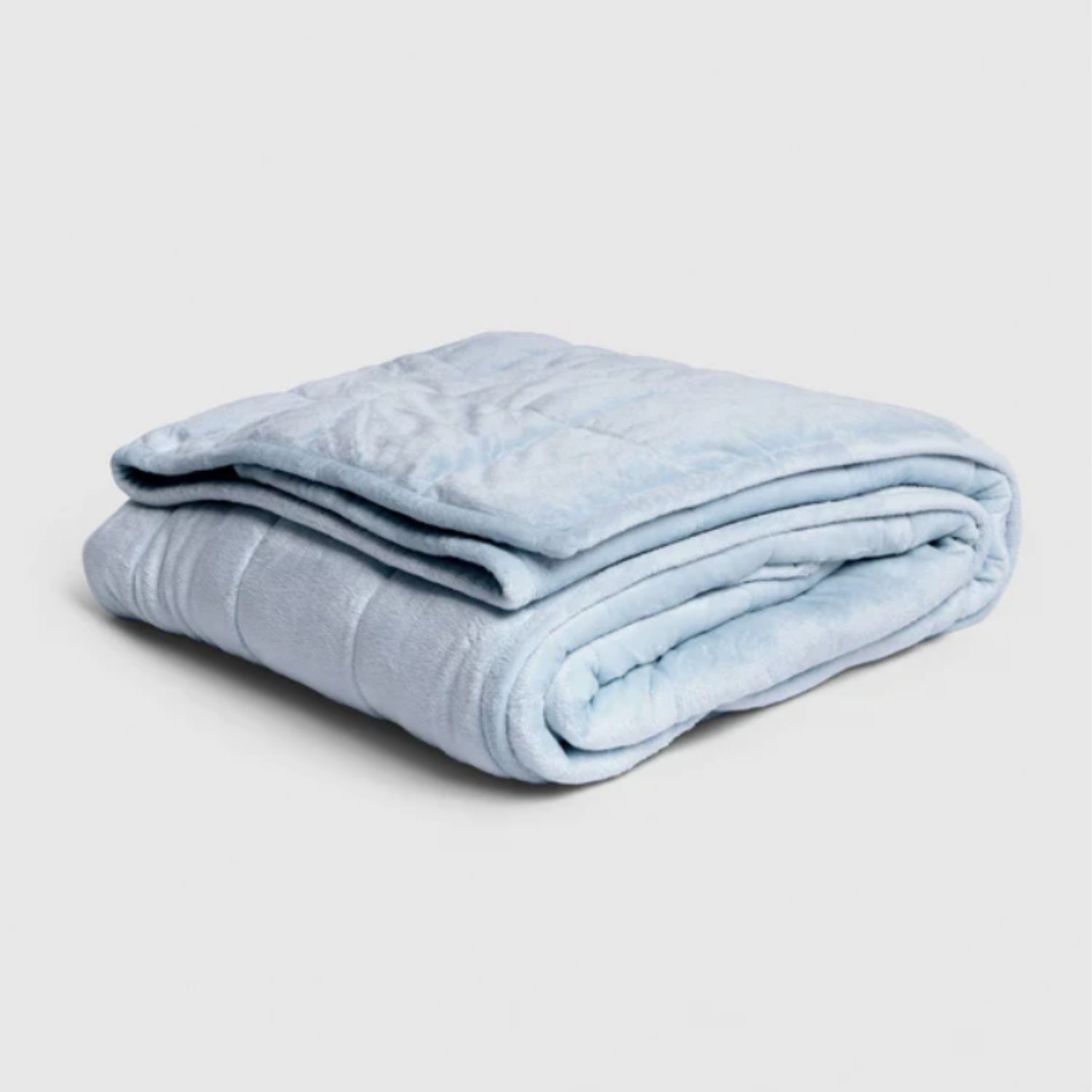
RRP: £49 | Weight: 4.5kg or 6.8kg | Materials: 100% polyester, glass beads filling
Oodie is known for its comforting onesies, but the brand also offers thick, cosy weighted blankets, so I was excited to try this option. Sitting at the same price as the Kudd.ly blanket, this is another great budget option that will see you through cold nights as well as relieve anxiety and other issues with sleep. While the 9kg option isn’t available at the moment, there’s also 4.5kg and 6.8kg weights on offer. Though there isn’t the option of various sizes, I found that this slightly larger blanket was perfect for keeping on the sofa and using on nights when I wanted to relax and stay warm.
The thick material of this blanket is a soft, cosy fleece-like polyester, which is ideal for cold nights and ultimate relaxation. However, I do think that if you run particularly hot, find it difficult to sleep in the heat, or are a sweaty sleeper, this material might be a bit too much for you. I also can’t imagine using it in summer, despite how comforting it has been in colder temperatures. Despite this, I still think this is a great option for cosying up with on the sofa and I also love the icy blue shade it comes in.
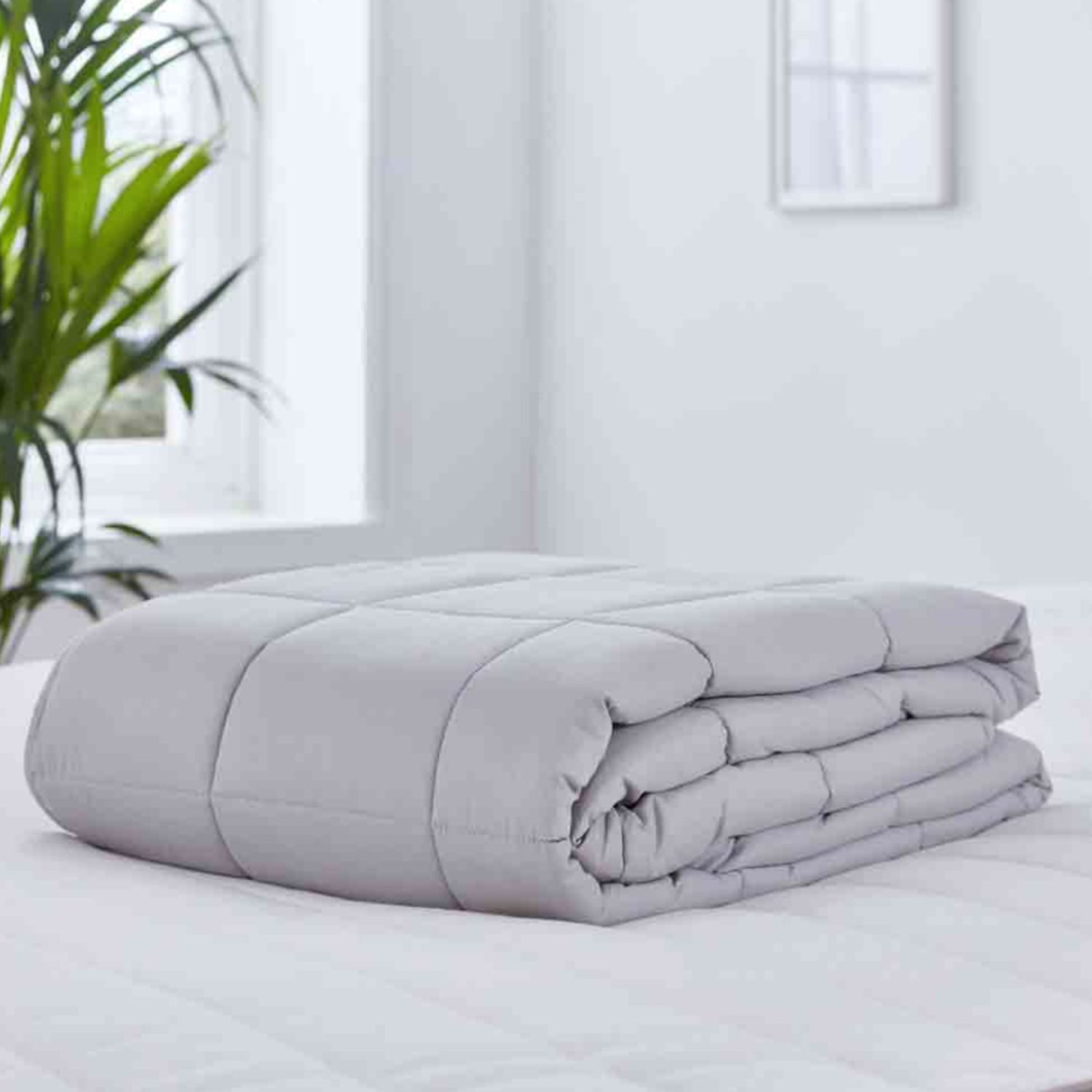
RRP: £100.99 | Weight: 7kg | Materials: 100% cotton, glass beads and polyester fibre filling
With a cover made from 100% cotton and a thinner feel than most of the other blankets I tested, this option is ideal for those who love a pick of the best thin pillows and don’t want to be completely overwhelmed by their weighted blanket. The Martex Weighted Blanket is very breathable and surprisingly light, despite coming in the medium-range weight of 7kg. The glass and polyester fibre micro-bead filling is hypoallergenic, so this is also a good option for anyone with allergies.
While I loved having a thinner and less intense blanket to try, I do think that I prefer a more cosy feel to my blankets. I was also disappointed that the Martex only seems to come in one colour, a (fairly drab, in my opinion) shade of grey. However, for a premium blanket that does what it says on the tin, I recommend this option.
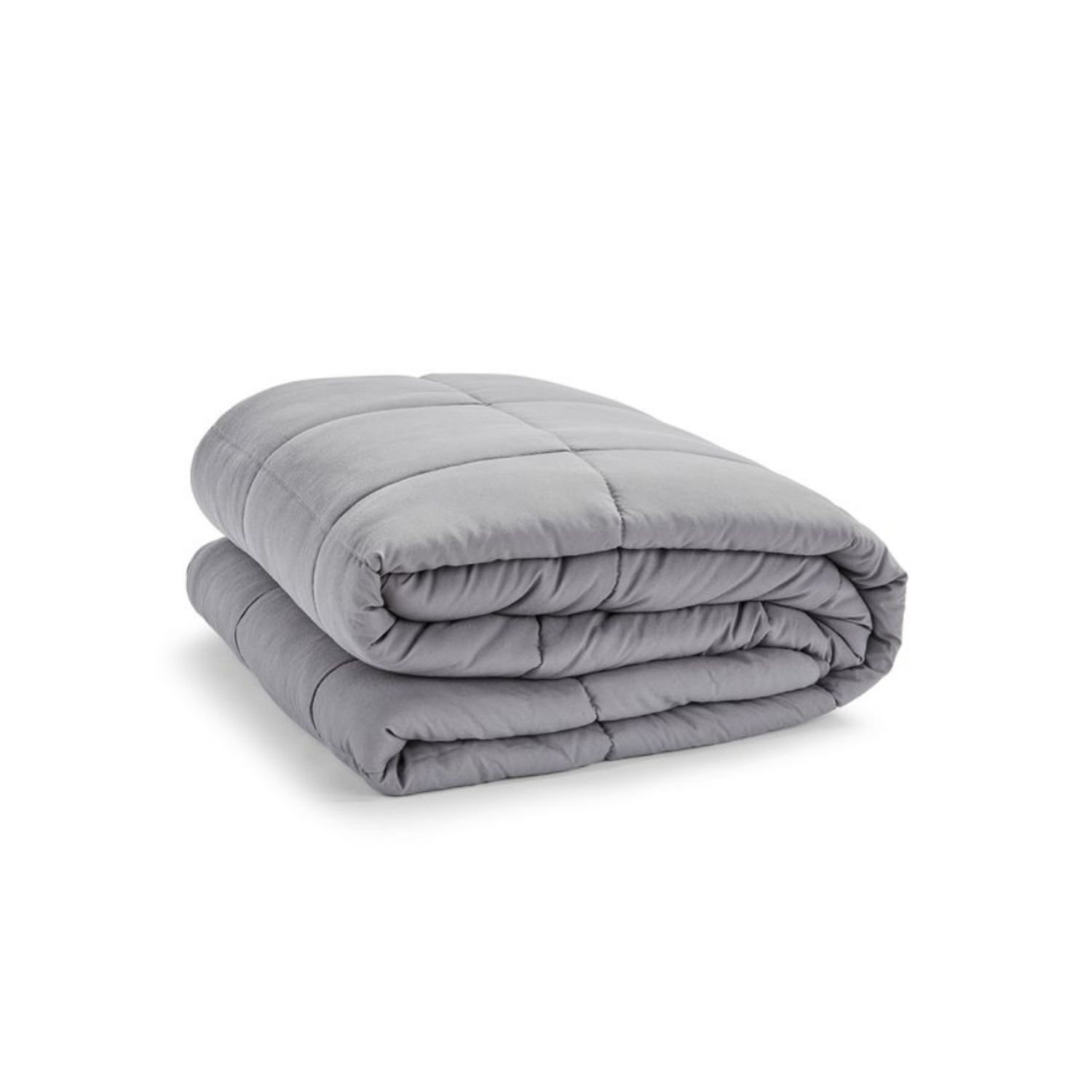
RRP: £55 | Weight: 9kg | Materials: 100% polyester, glass beads filling
Weighted blankets should weigh about 10% of your bodyweight, so if you weigh around 90kg, this blanket will be ideal. If you do weigh less than this, though, this Silentnight option is likely to feel a little intense. Despite its heaviness, however, the weight is evenly distributed to provide a comforting feel, and when it comes to soothing anxiety, a heavier blanket could be the way to go.
The Wellbeing Weighted Blanket definitely isn’t as soft or cosy as an option like the Dreams blanket, for example, but if your priority is a weight that will satisfyingly comfort you and provide that relaxing feeling, this is a good investment. As one of the best weighted blanket deals, another bonus is also the low price - a bargain when you consider the weight and quality of the blanket. Plus, the blanket is hypoallergenic, which is an added pro for those who struggle with allergies.
How we tested the best weighted blankets
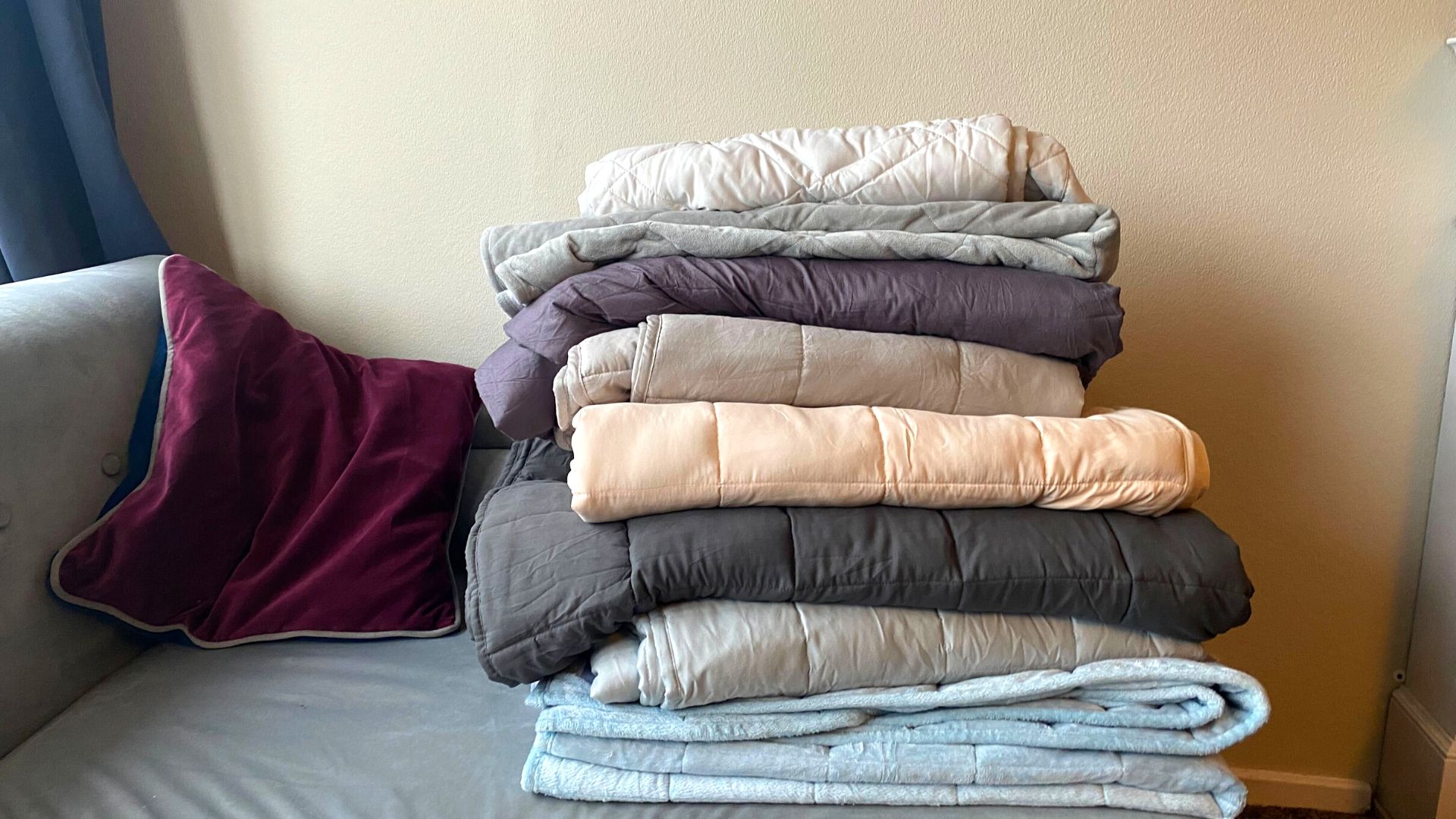
A selection of the best weighted blankets as tested by shopping writer Hannah Holway.
There were a few things we kept in mind when we tested the best weighted blankets, including:
- Weight: As we've said, the weight your blanket should be is dependent on your own body weight. Despite this, I tried a few different weights to see if it made a difference to how relaxed I felt and how they operated as sleep aids.
- Anxiety and sleep: As this is the purpose of a weighted blanket, I paid close attention to how I felt during and after using the blankets, asking questions such as: did I sleep better under it? Did I feel noticeably more relaxed?
- Price: Weighted blankets are often at a similar price, but some of the more premium sleep brands such as Emma and Simba can charge a bit more for a blanket.
FAQ
How heavy is a weighted blanket?
There are lots of different weighted options out there when it comes to a weighted blanket, and often there are several weights to choose from when you purchase the blanket. Generally the lowest weight is 4kg, which is recommended if your body weight is around 40-50kg (or for a child or teenager - but children should never use a weighted blanket without adult supervision). The heaviest blanket we’ve seen is 9kg, which is recommended for someone with a body weight of around 90kg.
How to look after your weighted blanket
Fabio Perrotta, the director of buying at Dreams says knowing how to clean a weighted blanket is the first step to properly taking care of one. "Start by checking the care instructions provided by the manufacturer, as different blankets may have specific washing guidelines. For small stains, spot cleaning with a mild detergent and a soft cloth is often effective. If your blanket is suitable for it, you can hand wash it in a bathtub or large basin using a gentle detergent. Alternatively, many weighted blankets are machine washable - use a front-loading washing machine on a gentle cycle with cold water, however, make sure to check your washing machine load weight beforehand!"
When it comes to drying, he says, air dry the blanket to prevent damage to the weighted inserts." Lay it flat or drape it over a railing, avoiding hanging it from a single point, which could stress the seams. Keep in mind that weighted blankets don’t require frequent washing, and using a duvet cover can make cleaning easier.”
Tips for using a weighted blanket
- Make sure you’re using the right weight: Sammy Margo, a certified physiotherapist and sleep expert at Dreams says, “When using a weighted blanket, it’s crucial to make sure you’re choosing the right weight. Opt for a blanket that’s approximately 10% of your body weight." For example, if you weigh 65kg then your weighted blanket should be no heavier than 6.5kg.
- Start using a blanket gradually: “If you’re new to using a weighted blanket, start gradually, allowing your body to adjust by beginning with shorter durations and then increasing the time," says Margo.
- Opt for the right material for you: The physiotherapist also tells us that “you should consider the material of the blanket, especially if you’re sensitive to heat, as weighted blankets can be warm.” It's often why they are one of the best sleep aids for the winter months but not the best to use during the summer as the temperature rises.
- Keep your head, neck and feet out of the blanket: For safety reasons, it's best to keep your head and neck out from under the blanket while sleeping. If your feet tend to get too warm in bed then shuffle them out from under the blanket as well.
- Sleep on your back: When it comes to finding the optimal sleeping position for your weighted blanket, try sleeping on your back first. This will help to evenly distribute the weight of the blanket across your body.

Sammy Margo, MSc MCSP MMACP HCPC AACP, established her physiotherapy practice 25 years ago and is a spokesperson for the Chartered Society of Physiotherapy. Sammy discovered that a good night’s sleep can have a significant impact on an individual’s healing process, so she went on to author The Good Sleep Guide and The Good Sleep Guide for Children.
How can weighted blankets aid with sleep and anxiety?
Weighted blankets are so valuable to those who struggle with anxiety or insomnia as they provide Deep Touch Pressure (DTP), Margo says, which simulates the sensation of being held or hugged. "This, in turn, can stimulate the production of serotonin and melatonin, promoting relaxation and better sleep. The gentle pressure from the blanket may also help reduce cortisol levels, contributing to a decrease in stress and anxiety. Many users report enhanced sleep quality and an overall sense of security and comfort when incorporating a weighted blanket into their routine."
She continues, "These blankets are often used in sensory integration therapy, making them beneficial for individuals with sensory processing disorders, autism, or ADHD."
If you struggle with knowing how to fall asleep fast or find yourself waking up in the middle of the night and being unable to get back to sleep, a weighted blanket could help.
Sleep scientist and coach Dr Kat Lederle agrees. She says, “Weighted blankets provide deep pressure or touch stimulation. Humans are touch sensitive, so they convey safety and can calm us down. Because of the calming effect, it can help to reduce anxiety. Anxiety often gets in the way of good sleep, so using a weighted blanket of the right weight can help to lower activation of the sympathetic nervous system and instead activate the parasympathetic nervous system. When we are calmer, we find it easier to sleep.”
Dr Lederle also tells us: "Another factor that might help lower anxiety is that the blankets can give us a sense of being 'tucked in' and if this is something our parents used to do before saying good night, it can trigger happy, relaxing memories. However, there isn’t a lot of research or scientific evidence for this. They can safely be used by people who can remove the cover themselves, so not babies, children or frail adults."
Can anyone use a weighted blanket?
In short, no. Those with circulation issues, elderly people, pregnant women, very young children and anyone with conditions such as sleep apnoea should not use a weighted blanket.
Make sure you do your research before you buy a weighted blanket - and if you have a medical condition and feel unsure, definitely speak to your GP or another healthcare professional first.
Sign up for the woman&home newsletter
Sign up to our free daily email for the latest royal and entertainment news, interesting opinion, expert advice on styling and beauty trends, and no-nonsense guides to the health and wellness questions you want answered.

Hannah is the UK Shopping Writer for woman&home. As a shopping writer, Hannah has written on everything from period pants to wine subscriptions, and is especially interested in sustainable alternatives to well-known products, as well as books and homeware accessories.
Before she joined the team at woman&home Hannah headed up the social media accounts for Wonderland in 2019, where she was also a Contributing Editor for the magazine’s sister titles. During the COVID-19 pandemic, Hannah also explored evolving shopping trends at New York Magazine’s The Strategist UK, researching everything from face masks to status candles and even pens.
-
 Cherry blossoms aren't just blooming outside, they're springing up in our beauty bags too - here are 9 buys to embrace the soft trend
Cherry blossoms aren't just blooming outside, they're springing up in our beauty bags too - here are 9 buys to embrace the soft trendFrom delicate, floral fragrances to cherry blossom-powered skincare, the beauty world is besotted with the pink flower this spring...
By Naomi Jamieson Published
-
 Amanda Holden's gold choker necklace is the perfect jewellery to wear with collared shirts
Amanda Holden's gold choker necklace is the perfect jewellery to wear with collared shirtsFinding necklaces to wear with shirts can be tricky, but Amanda Holden has struck gold.
By Charlie Elizabeth Culverhouse Published